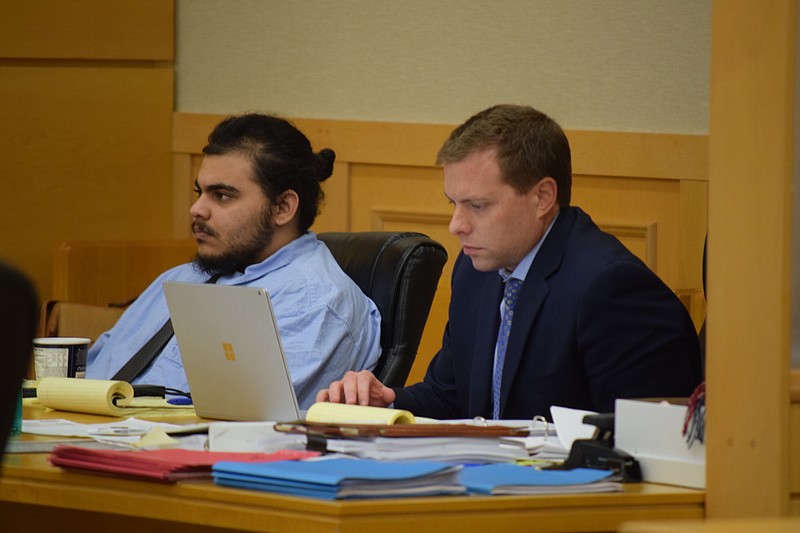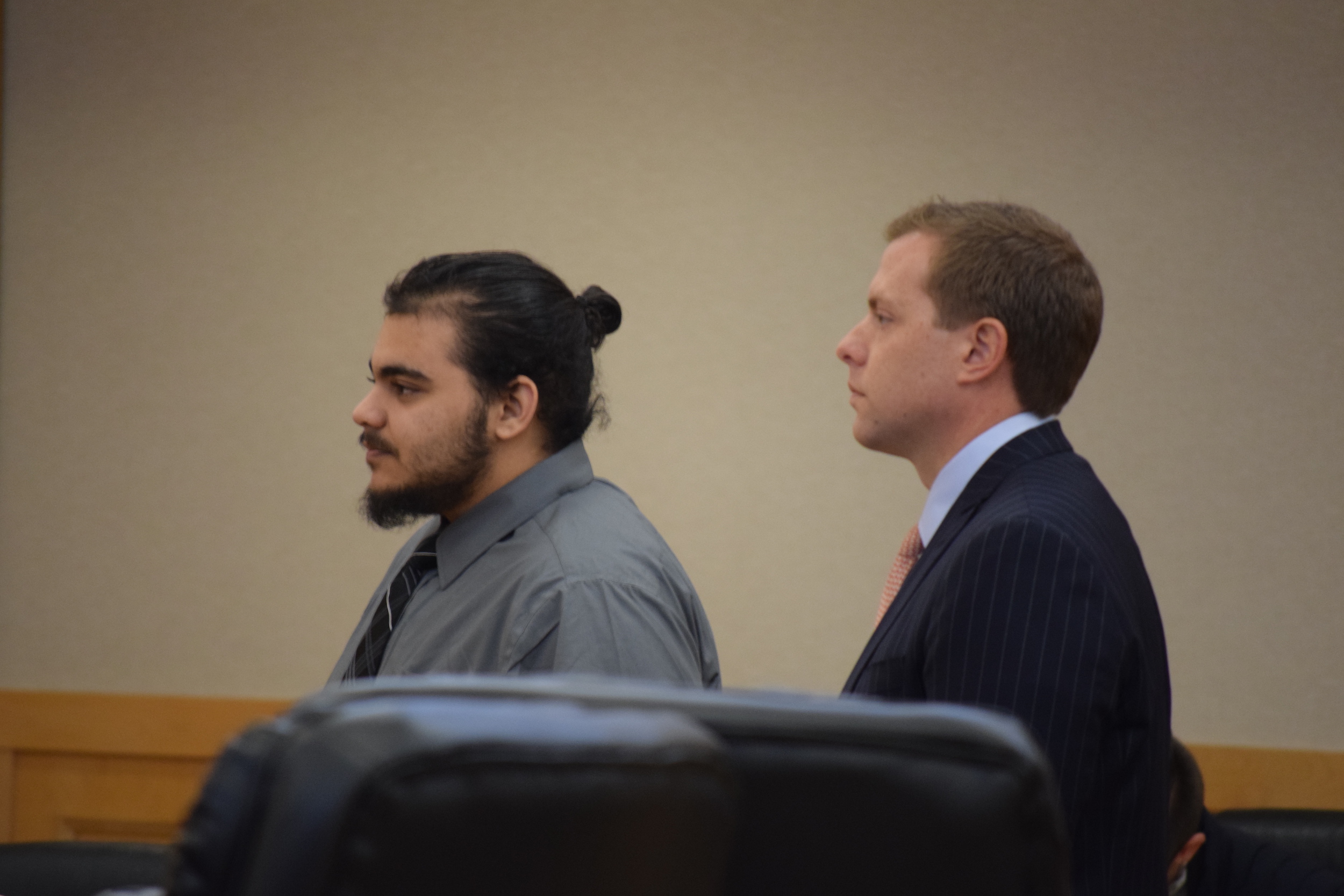ATHENS, Tenn. - After less than two hours of deliberation Wednesday, jurors in McMinn County found Joseph Wielzen guilty of first-degree felony murder and aggravated rape in the 2017 slaying of 18-year-old Kelsey N. Burnette.
Wielzen, 19, sat quietly as the verdict was read.
The jury's work isn't over, however. Jurors must reconvene at 10 a.m. Thursday for the sentencing phase of the trial, because the state has asked for enhanced sentencing. Jurors will decide whether Wielzen will serve a life sentence with or without parole. The judge will determine the sentence on the rape conviction at a later date.
After the verdict was read, the victim's mother, Virginia "Sissy" Burnette, said she was glad "it's finally over."
"I'm pleased with everything that took place today," Burnette said, praising the district attorney's office and investigators.
"We had a feeling from the get-go that it was him," she said. "Now we can get back to memories."
While she was happy with the verdict, Burnette said she would never get over the loss of her daughter.
Wielzen was 17 at the time of the crime but was tried as an adult after his charges were transferred from juvenile court in September 2018.
After her disappearance on June 30, 2017, or July 1, 2017, after a party at a home on Athens Pike in Etowah, Tennessee, Burnette's body was found July 4, 2017, stuffed into a garbage can in a wooded area in downtown Etowah.
Burnette, who graduated from McMinn Central High School a couple of months before her death and worked at the local McDonald's restaurant, was reported missing by her family to the Tennessee Bureau of Investigation on July 1, 2017. Wielzen was arrested in June 2018 and indicted in July.
In the state's closing statement Wednesday, Assistant District Attorney Coty Wamp told jurors that while DNA evidence didn't link anyone to the crimes or the murder weapon, Wielzen's own statement and circumstantial evidence tied him to the killing and rape. Wamp suggested Wielzen was planning the night far ahead, supplying alcohol to the group of teens not old enough to drink.
Wamp reviewed testimony over the last six days and pointed to details in witness Zack Swanson's testimony regarding Wielzen's appearance when he saw him at midnight within the time frame of Burnette's disappearance after the party at the Athens Pike home. Swanson testified that Wielzen's hair was "messed up," one of his pockets was pulled out of his pants when he entered the back door of the house and he was "acting weird."
Wamp also pointed to testimony from witness Koty Moore, who had been at a neighbor's house until he returned to the home around 4-5 a.m. on July 1, 2017, and saw Wielzen pacing around the laundry room, talking on his phone. Burnette was nowhere to be seen.
Wamp said rain on June 30 and July 1, 2017, likely ruined blood evidence outside the home, so DNA evidence was hard to successfully retrieve. There was DNA belonging to Burnette on the murder weapon - a red baseball bat - found in the yard of the home.
Wamp told jurors that the law doesn't require DNA evidence to convict anyone for rape or murder and suggested they not be surprised by the lack of DNA evidence.
Wielzen's attorney, Andrew Brown, in his closing statement, told jurors that no testimony placed Wielzen's hands on the murder weapon and the state never provided a crime scene or time of Burnette's death.
Brown said state witness testimony didn't suggest Wielzen was acting inappropriately or violently and he was described in some testimony as "calm and reassuring" during the chaos that followed Burnette's disappearance.
Brown pointed to DNA found on the bat that belonged to an "unknown male," according to a defense witness DNA expert for the defense, as reason to doubt the state's theory that Wielzen was the culprit. Of five other profiles tested, only Burnette's DNA was confirmed on the murder weapon.
Brown said the state's timeline was countered by defense testimony from a neighbor's child who testified that a girl with red hair was pacing nearby with her cellphone and cigarettes in her hand around 7:30-8 a.m. on July 1, 2017, placing this incident at a time after others testified that Burnette couldn't be found.
District Attorney General Stephen Crump gave the state's closing statement, telling jurors the circumstantial evidence they had heard was like a building storm growing louder and louder. Crump disputed any ideas that Burnette consented to sex with Wielzen, referring the last text message sent from Burnette's cellphone at 3:14 a.m. July 1, 2017, about her heavy menstrual bleeding. Crump suggested that Wielzen put the murder weapon near where Burnette's boyfriend, Nick Rose, was passed out in a car outside the home to divert attention from himself.
Jury selection began Nov. 12 in the case. The state rested Tuesday after the testimony of two forensic experts, while the defense called its first three witnesses late in the day. The defense then put three witnesses on the stand Tuesday afternoon, followed by two expert witnesses on Wednesday before resting.
In testimony Wednesday morning, a DNA expert for the defense testified that there was a high probability that the defendant's DNA was not on the handle of the baseball bat authorities identified as the murder weapon.
(Read more: DNA not on murder weapon, says expert in McMinn County rape, murder trial)
William Allan, of Cybergentics, a Pennsylvania company that produces DNA analysis software called TrueAllele, testified under direct examination by Brown that DNA analysis of the handle of the baseball bat didn't show any matches to Wielzen.
Allan testified Wednesday morning that his DNA analysis was conducted on the handle of the bat and DNA profiles were drawn from the bat for comparison purposes. He also said DNA from an "unknown male" was present on the bat handle, but it was not matched to any of the primary persons attending the party on June 30, 2017, just prior to Burnette's slaying.
On cross examination by Assistant District Attorney Paul Moyle, Allan said the lack of Wielzen's DNA on the bat handled didn't mean that he never touched the bat, only that there was none of his DNA found on the handle. Allan didn't test the rest of the bat, he testified. The defense rested its case after Allan's testimony.
Contact Ben Benton at bbenton@timesfreepress.com or 423-757-6569. Follow him on Twitter @BenBenton or at www.facebook.com/benbenton1.


